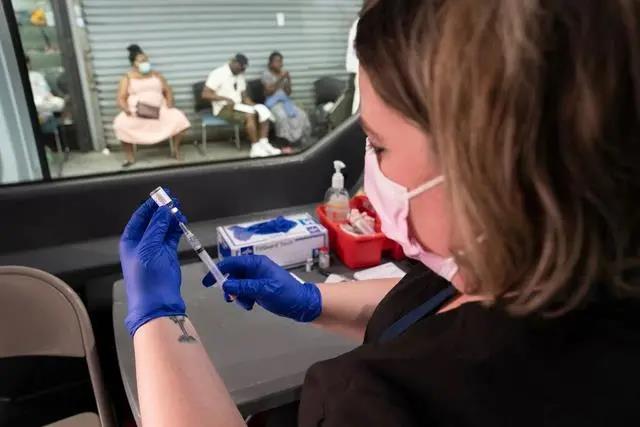Why are people still infected after receiving COVID-19 vaccines?
- A Single US$2.15-Million Injection to Block 90% of Cancer Cell Formation
- WIV: Prevention of New Disease X and Investigation of the Origin of COVID-19
- Why Botulinum Toxin Reigns as One of the Deadliest Poisons?
- FDA Approves Pfizer’s One-Time Gene Therapy for Hemophilia B: $3.5 Million per Dose
- Aspirin: Study Finds Greater Benefits for These Colorectal Cancer Patients
- Cancer Can Occur Without Genetic Mutations?
Why are people still infected after receiving COVID-19 vaccines?
Why are people still infected after receiving COVID-19 vaccines? As billions of people around the world have been vaccinated against COVID-19, reports have shown that cases of re-infection after vaccination have become more common. Experts said that this phenomenon is not surprising and does not mean that the protective effect of the vaccine has failed.
“Breakthrough infection”: Maybe the vaccination method is related
According to U.S. media reports, in the past week, at least three New York Yankees, one Olympic gymnastics alternate, several Texas state legislators, one White House official, and staff in the office of Speaker of the House of Representatives Pelosi have been arrested. Detected positive for the new coronavirus. They all have one thing in common-everyone has been vaccinated against COVID-19.
According to experts, this phenomenon is called “breakthrough infection.” Roy Gulick, director of the Department of Infectious Diseases at Weill Cornell Medicine in New York, said that even with very effective vaccines, breakthrough infections are inevitable.

▲The vaccine is injected through the arm, so antibodies are produced in the lymph nodes and organs near the chest, but less in the nasal cavity and upper respiratory tract. According to “New York Times”
So, why is there a “breakthrough infection”?
Tulane University School of Medicine professor and physician Jay Coles explained that most of the breakthrough infections that have occurred so far are asymptomatic, which means that they only occur in the nasal cavity and upper respiratory tract and do not damage the lungs. Department or other important organs inside the body. The emergence of this phenomenon is likely to be related to the injection method of the COVID-19 vaccine.
After being vaccinated with the COVID-19 vaccine, the human body will produce several types of “immune fighters” under its stimulation, including antibodies that prevent the virus from invading healthy cells and T cells that hunt infected cells. At present, the new coronavirus vaccine is often injected through the arm, so antibodies are produced in the lymph nodes and organs near the chest, but less in the nasal cavity and upper respiratory tract.
And this is not a pure conjecture. There have been precedents that have proved that the way the vaccine is inoculated will have an impact on its effect. For example, the first polio vaccine that successfully prevented the disease was also injected into the muscle. But a few years later, the oral polio vaccine developed by the researchers more successfully prevented the infection by preventing the polio virus from penetrating into the intestine.
Some people have misunderstandings about the efficacy of vaccines
Steen Wimond, dean of the Yale School of Public Health and infectious disease epidemiologist, said that many people have misunderstood the efficacy of vaccines, believing that vaccines can turn us into completely immunized people and immediately wipe out what we encounter. Any virus, but this idea is wrong. “People think that vaccines are like insect killers. (viruses) will disappear when they come into contact with mucous membranes, skin, or reproductive tract. It’s not exactly like this. It’s more like a poisonous trap. Pests may fall in and move around. , And then killed by insecticides.” He explained.
In addition, he emphasized that not all infections will develop into COVID-19 pneumonia. A positive test means that you are infected with the new coronavirus that can cause COVID-19 pneumonia, that is, the presence of active new coronavirus in the nasal cavity or oral cavity. However, COVID-19 can only be diagnosed when the infection causes symptoms such as fatigue, fever, and cough. A large proportion of infected people never show symptoms, which is the so-called asymptomatic infection.
Therefore, if the vaccinated person is not regularly tested, many breakthrough infections may be ignored as a mild cold, or may not be noticed at all.
The COVID-19 vaccine is not perfect, but it can effectively prevent severe illness
In addition, it needs to be pointed out that, like all vaccines already on the market, the COVID-19 vaccine is also not perfect. Just as natural infection does not guarantee that you will not be reinfected by the virus, immunity does not provide perfect protection.
However, according to clinical trials and real data, vaccination with the COVID-19 vaccine can widely protect people from the harmful effects of the virus.

▲According to clinical trials and real data, vaccination with the nCOVID-19 vaccine can widely protect people from the harmful effects of the virus. According to “New York Times”
Dr. Anthony Fauci, a top infectious disease expert in the United States, also said that because the new coronavirus and pathogens themselves have been constantly evolving, the scientific understanding of vaccines and epidemics is also a dynamic process. He said: “When a breakthrough infection occurs, it does not necessarily mean that the vaccine has failed. This is still the case, especially (the role of the vaccine) in preventing serious diseases.”
Gulick said that almost all new patients with COVID-19 pneumonia in the United States are people who have not been vaccinated. He added: “(Currently) more than 97% of people hospitalized are unvaccinated, and almost all American patients who have recently died of COVID-19 pneumonia have not been vaccinated.”
He also emphasized that when comparing the infections of vaccinated and non-vaccinated people, “the frequency of occurrence of mutations is roughly the same”, which indicates that no special
(source:internet, reference only)
Disclaimer of medicaltrend.org
Important Note: The information provided is for informational purposes only and should not be considered as medical advice.



